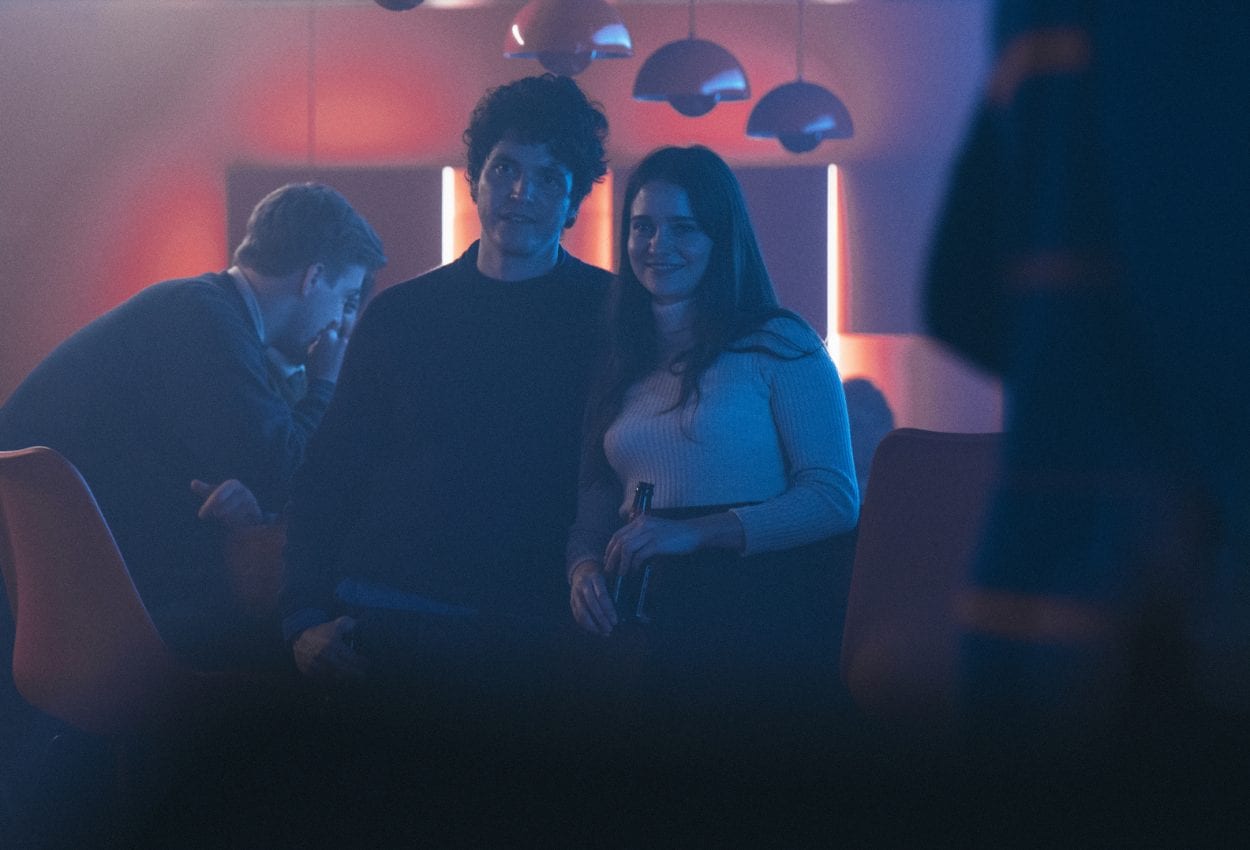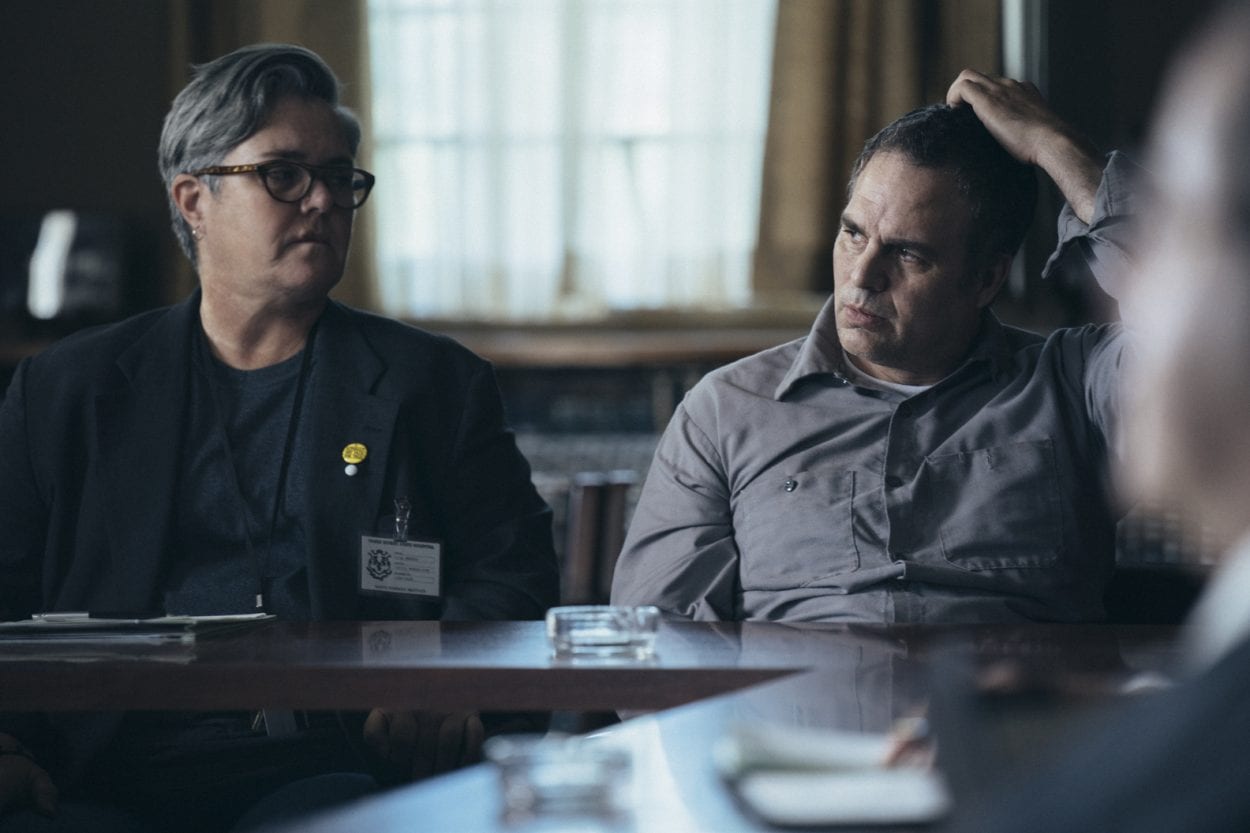I Know This Much Is True S1E4 begins in the aftermath of Dominick’s car crash at the end of S1E3. Leo says he looks like “homeless Rocky” as they wait for the insurance man. It’s the day of Thomas’s hearing, but after dealing with his wrecked truck, Dominick gets Ray to take him to the Rood place so that he can remove shutters. You’ll recall that Henrey Rood has been bothering Dominick about the project by leaving him repeated messages. Is this why he feels compelled to go to work on this particular day, or is it perhaps more to distract himself from his problems?
Regardless, after he arrives Ruth tells him that her husband is having a bad day and asks if he could go away and come back another time. Dominick notes that he doesn’t have a ride—Ray is supposed to pick him up a bit later—so she acquiesces and he gets to work.
As he climbs a tall ladder, he starts to have flashbacks to when he and Thomas were younger. And then Henrey Rood appears through the window, puts a gun in his mouth, and pulls the trigger. Dominick recoils and falls some distance to the ground. Did those memories of Thomas (and Dessa) play some role in this? Did the pain medication that he was taking? Perhaps, but honestly, the simple fact of seeing a man shoot himself in the face right in front of you is probably enough to explain both the reaction and the fall.
You Are Me
The scenes set in the past might be the most compelling part of I Know This Much Is True S1E4, as they portray Thomas’s breakdown. First Dominick decides that he is going to dorm with Leo as a sophomore. When Thomas finds out, he thinks it is an administrative error but then proceeds to call his brother a traitor. More disturbingly, after they tussle and Dominick says that if he were Thomas he’d fix a broken chair before Ray gets home, Thomas says, “You are me” to him more than once.
They are identical twins, of course, but as they edge into adulthood Dominick has been trying to create some separation. He just wants his own life. There is nothing malicious about it, but rather something natural. He wants to define himself as you might think any young adult at that age would want to. When he says he is doing it for Thomas as well, perhaps he truly does think this will be good for the brother who has been relying on him a bit too much. Except his brother is mentally ill.
They watch the draft lottery together at a bar, along with numerous others. Thomas’s birthdate comes up, but Dominick’s does not, from the simple quirk that the former was born a few minutes before midnight on December 31st and the latter was born just after on January 1st.

And it is Thomas who is struggling in school. This is what Dominick remembers just before Henrey Rood kills himself—his brother showing up to his door to tell him that he’s dropped out. This makes no sense, of course, since being in college is the one thing that might protect him from being sent off to Vietnam.
Back at home, Thomas tells Dominick that he’s figured out the problem—it’s receivers in his mouth. But he’s been working on removing them. If it hadn’t been clear already, this brings home the fact that Thomas is not well. This is the moment when Thomas is institutionalized. On the bright side, he wasn’t sent off to die in Vietnam.
Phillip Ettinger is great in his role portraying the younger Thomas and Dominick, by the way. Mark Ruffalo might get more acclaim at the end of the day, but Ettinger’s work is really worth noting.
It’s a Small, Stifling, Suffocating World
Back in the present of 1990, Dominick wakes up in the hospital several days after his fall. He’s missed his brother’s hearing and desperately wants to call Sheffer but is forced to wait until morning. She comes to visit him, tells him how it went, and says that she understands now why he is so pissed off.
I Know This Much Is True S1E4 presents some of the hearing to us as Dominick reads the transcript. Dr. Hume (Bruce Greenwood) grills Thomas about why he cut his hand off. Thomas quotes Matthew but says it was not to atone for his sins but America’s. War is profitable, but with the Gulf War, he claims, the country is on the brink of unleashing something devastating to the world.
We see again how delusion is often caught up in the political, with a tinge of the supernatural, but it’s not clear that Thomas is entirely wrong here if we put aside his notion that cutting his hand off could help the problem. What he is criticizing is America’s history of militarism and interventionism, and these questions are at least worth thinking about.
That’s not the kicker, though. This occurs when Hume pushes Thomas on the fact that he hears voices. Does he always feel compelled to do what they say?
Thomas says he listens to the good ones but resists the bad ones. How does he tell the difference? All he has to say, basically, is that it is clear. You know when it’s Jesus talking to you—and he talks to all of us, by the way. Thomas just listens.
What if Jesus told him to kill someone? Thomas’s first response is the right one: Jesus wouldn’t do that. But he fails to stick to that as Hume pushes the hypothetical. He ultimately gets Thomas to say that he would indeed cut a librarian’s throat if Jesus told him to.
All of this is immensely unfair, and Sheffer is right to be pissed off by it. From a certain point of view, Hume’s concern makes sense. Here we have a man who hears voices and says he does what the good ones tell him to do. How can we trust his ability to know the good from the bad? What if he might come to think that Christ himself has told him to cause others harm?
But this represents a serious misunderstanding of mental illness. It’s almost as if Hume believes that angels and devils really are talking to Thomas, and his whole notion of the possibility of Jesus telling Thomas to kill an agent of Satan stems more from Hume’s thoughts about religion than the patient’s.
Thomas makes it clear that he believes that Jesus would never ask him to do such a thing. So if he heard a voice asking him to, he would know that is not Jesus. In its own way, this is Thomas showing that he has a conscience. He doesn’t just do whatever a voice tells him. It’s all parsed through his own sense of what is right and what is wrong. He just can’t put it that way. That’s not how he views the world and his experience of it. But he says he fights the bad voices. He has a sense of right and wrong that Hume just fails to recognize.

It turns out that Nedra is the girlfriend of Dominick’s roommate at the hospital. She arrives at the end of I Know This Much Is True S1E4 and gives him the translation of his grandfather’s manuscript, though she says he might not want to read it.
This makes me think again that Dominick’s grandfather may also be his father, but I suppose we will find out. I am more curious about what has been going on with Nedra for the past few years, but I don’t know if we’ll find out about that.
I Know This Much Is True is pretty squarely focused on Dominick (and Thomas), so I expect the remaining two episodes will delve into the story of their grandfather and what ultimately happens with Thomas.
I’m not expecting a happy ending to this story. It’s not possible, really, but that doesn’t mean the whole thing isn’t worth going through.

